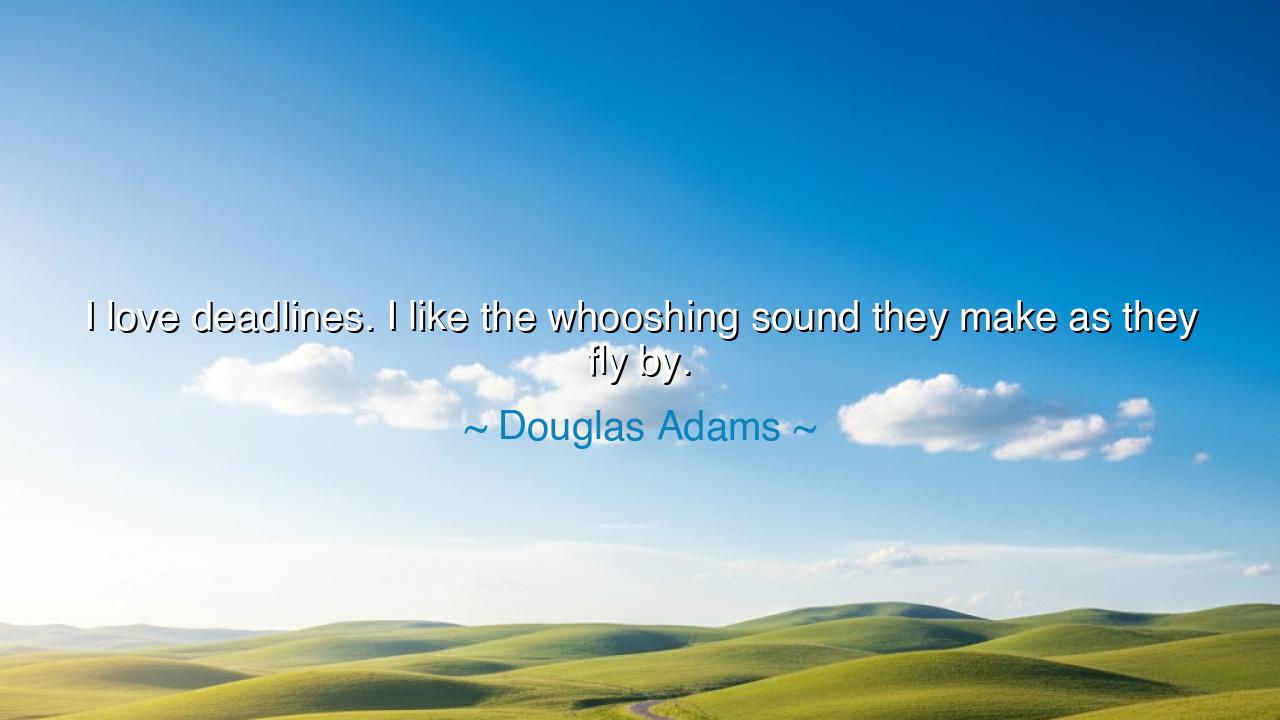
I love deadlines. I like the whooshing sound they make as they






Listen, O children of the earth, to the words of Douglas Adams, who spoke with both wit and wisdom: "I love deadlines. I like the whooshing sound they make as they fly by." These words, though wrapped in humor, carry a deeper truth about the nature of time, pressure, and the human response to the challenges that lie before us. Adams, known for his wit in the Hitchhiker’s Guide to the Galaxy, presents a playful reflection on the often intimidating and relentless nature of deadlines. Yet, in this humor lies a powerful lesson: how we relate to time and deadlines shapes our experience of life itself.
In the ancient world, the concept of time was often viewed with a sense of urgency, for life was fleeting and unpredictable. Herodotus, the ancient historian, recorded the exploits of great men, and it was clear from his accounts that they too struggled with deadlines—not as arbitrary dates, but as the weight of fate that loomed over their every decision. For men like Alexander the Great, whose empire spanned from Greece to India, time was both a precious resource and an ever-present enemy. He needed to conquer swiftly, for the turn of fate was unpredictable. But, like Adams, he often faced the relentless march of time, unable to control the outcome despite his efforts.
Adams’ humor, however, offers a more playful yet insightful reflection. When he speaks of loving deadlines and the "whooshing sound" they make as they fly by, he acknowledges the chaotic nature of life—how time slips away despite our best intentions. The very essence of procrastination, a universal aspect of the human condition, is found in Adams' words. Just as the ancient philosophers like Socrates and Plato pondered the nature of the self and the universe, so too must we understand that we are shaped by our relationship with time—and especially by how we handle the pressures that accompany it.
Consider the example of Leonardo da Vinci, who often faced tight deadlines while working on some of his most famous pieces, such as the Mona Lisa. His creativity and genius were bound by time constraints, yet he was notorious for his ability to let deadlines pass as he perfected his work. Da Vinci’s willingness to extend his process, to embrace the uncertainty of deadlines, mirrors the playful resignation Adams speaks of. Da Vinci, like Adams, understood that creativity cannot always be rushed—sometimes, the best results come when we allow time to slip by rather than force our creations into rigid constraints.
Adams’ words also point to the relativity of time. To some, deadlines are a source of anxiety and stress, yet for others, they are a game—a challenge to be outwitted and played with. The ancients often viewed the passage of time not as something to be feared, but as an inevitable force that must be embraced and even celebrated. For the great leaders, thinkers, and creators, time was both a constraint and a guide. They understood that struggle with time was part of what made their work meaningful. It was not the deadline itself that mattered, but how one responded to it—whether with dread or with playful defiance.
The lesson here, O children of the earth, is one of perspective and acceptance. Time, like all forces in the universe, cannot be controlled or conquered. It will pass, with or without our consent. Adams’ playful approach to deadlines encourages us to embrace the flow of time, rather than fight it. Time cannot be forced, and neither can creativity or purpose. Instead of viewing deadlines as enemies, we should view them as invitations to action, reminders of our finite existence, and opportunities to reflect on how we spend the precious moments given to us.
In your own lives, O seekers of wisdom, do not fear deadlines. Understand that they are not the oppressors, but the reminders of the preciousness of time. Learn to play with time rather than be overwhelmed by it. Use your deadlines not as tools of stress, but as markers of progress and focus. Allow yourself to move within time’s flow, knowing that the most important task is not merely to meet the deadline, but to ensure that you are creating work that has meaning—work that reflects your best self, and leaves behind a legacy worth remembering.
Remember, O children of the earth, that in the grand scheme of life, time is both precious and elusive. Embrace it with joy, with humor, and with wisdom, for it is through how we manage time—both the moments and the deadlines—that we define our journey. Just as Adams found humor in the "whooshing sound" of deadlines, find joy in the creative process and embrace the rhythm of time as it guides you toward your ultimate destiny.






AAdministratorAdministrator
Welcome, honored guests. Please leave a comment, we will respond soon